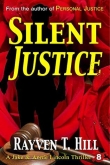
Текст книги "January Justice"
Автор книги: Athol Dickson
Жанр:
Криминальные детективы
сообщить о нарушении
Текущая страница: 14 (всего у книги 24 страниц)
28
Rolling up the driveway at El Nido, I saw Teru coming my way in a white Porsche Carrera. It was almost dark, so he was headed home. We stopped alongside each other. He rolled down his window. I said, “New car?”
He grinned. “Just bought it this morning. It’s ten years old, but the mileage is low.”
“Sensible yet entertaining. Haley would like it.”
“Yeah, I think she would.”
“Speaking of what she would like, I have a proposition to discuss, if you’ve got a few minutes.”
Teru turned the Porsche around and followed me to the main house. We parked by the front fountain and went around the side. Simon somehow knew we were coming. He opened the door before I could ring the bell.
Sitting with the two of them at the kitchen table, I said, “So I was thinking, what if I did keep this place?”
Teru looked at Simon. Simon looked at the ceiling.
Teru said, “What about Haley’s reputation? You said people would want to know how you got the money. They’d find out about the marriage, and she’d be disgraced.”
“All true. But I was thinking about you guys, and what a shame it was that we’d have to split up, and how Haley would hate that…and all of a sudden I realized there’s a simple solution. And before that I was thinking about all the things Haley did behind the scenes, the hospitals and schools and all, and how hardly anybody knows she was the one who paid for everything. And I realized, just because I inherited a few hundred million doesn’t mean I have to act like I inherited a few hundred million.”
Teru smiled and began to nod, but Simon said, “I’m afraid I don’t quite…”
I said, “It’s so obvious I missed it. Haley and I managed to keep our marriage out of the press because I kept driving for her and living in the guesthouse and just in general behaving as if I was nothing more than her chauffeur and bodyguard. For some reason, I’ve been thinking that would have to change if I accepted the inheritance. But I could just keep doing the same thing. As long as I don’t act like I’m rich, there’s no reason anybody has to know it all belongs to me. You both want to continue doing what you do. Gardening. Buttling. I can’t imagine anything better than what I do either. So why don’t I just keep on living in the guesthouse and working, and you guys just keep on doing what you do, and we can kind of leave things like that, if you’re agreeable?”
Teru said, “Half the working stiffs I know have maxed out all their credit cards so they can pretend to live like a multizillionaire. You’d be an actual multizillionaire living like a working stiff. I love it.”
Simon said, “It could work.”
“You bet it could,” I said. “I’d rent the big house out to people who need our kind of special services. I’d drive for the tenants when they want a chauffeur, and you guys would do what you’ve always done for Haley. That way we could all stay here and keep working together.”
“And watching each other’s backs,” said Teru.
“Lately you two have been doing that a lot for me, but yeah, I would kind of like a chance to return the favor if either of you ever needs a hand.”
Simon said, “And if the residents of El Nido prove to be…undesirable?”
“Either of you guys ever says the word for any reason, and they’re gone. They’d never even know it was us who got them kicked them out. I’ll use that attorney in New York to hire a property manager to handle everything. And the rent on this place ought to cover our salaries.”
“That would not be necessary,” said Simon. “As I mentioned previously, Miss Haley was quite generous to me financially in her will.”
“Yeah, but this would be us doing what we’re good at, and even a rich man should be paid for the use of his skills. That applies to everyone, including me.”
Teru looked surprised. “You’d take a salary too?”
“I won’t live off of Haley. Not even when she’s gone. Especially when she’s gone.”
Simon stood, filled a pot, and put it on a burner to make tea. “I believe Miss Haley’s friend Mr. Higgins is in the estate-management business.”
I said, “By Jove, I believe he is.”
Teru laughed and said, “Haley would just love this.”
“But there’s still one thing that could queer the deal.” I looked at Simon. “You’ll have to stop calling me ‘Mr. Cutter’ or ‘sir.’ People would get suspicious.”
“That is regrettable,” said Simon with the barest hint of a smile. “One did enjoy it while it lasted.”
29
It turned out there weren’t a lot of people lined up to rent a thirty-million-dollar mansion… unless it once belonged to Haley Lane. Apparently that did make a difference. Haley’s old friend Higgins had a steady stream of lookers coming through over the next week.
Higgins was a funny-looking little guy, all knees and elbows, with pure black hair that stood up in the back like Alfalfa’s in The Little Rascals, and a way of cocking his head and staring hard at you no matter what you said, as if he found your every word amazing. Simon met all of Higgins’s prospects at the mansion’s main entrance, of course, but Teru and I also wanted a say in who rented the place, so we worked out a signal.
When Higgins thought the lookers might be serious, he would go outside to his Jaguar convertible and put the top down. Then Teru and I would wander over, and Simon would introduce us as “Mr. Fujimoto, the estate horticulturalist, and Mr. Cutter, who would be your on-site chauffeur, should that service be desired.”
We were all pretty pleased with one young couple. They had three cute children, two girls and a boy, and a Swedish nanny, a plump woman of about fifty with a sparkle in her eye. The husband ran a hedge fund, and the wife sat on the boards of several admirable philanthropic organizations. The American Cancer Society. The Society for the Prevention of Cruelty to Animals. That kind of thing. It seemed like a good fit until Simon overheard the woman say something to the man about how good the “Oriental yard boy’s” English was.
Higgins brought another prospect over the next morning. I thought he looked familiar from a distance, so although Higgins hadn’t lowered the convertible’s top, I went over for a closer look.
Simon started to introduce us, when the man said, “Why, sure. I know you. It’s Malcolm isn’t it? Malcolm Carver?”
Up close I recognized him as Sidney Gold, one of the most successful executive producers working out of Warner Brothers. He was built like a five-and-a-half-foot-tall spark plug, round all the way up and down. His curly salt-and-pepper hair was about two inches long, and he wore horn-rimmed glasses, a plain-white dress shirt with the tail out, a pair of blue jeans starched with a knife-edged crease, and leather loafers without socks. He had a funny way of talking like Popeye through one side of his mouth. I wondered if he had suffered a small stroke.
I said, “It’s Cutter, actually. Malcolm Cutter. How are you Mr. Gold?”
He snapped his fingers as if he was a little put out with himself. “That’s right. Malcolm Cutter, sure, sorry about that. Call me Sid, okay? And to tell you the truth, I could be better. Looks like the wife wants a divorce.”
“I’m sorry to hear that.”
“Well, maybe I work too much like Fanny says. Say, what are you doing here?”
“I live in the guesthouse over there. I drive for people who live here.”
“No kidding? Is that sort of a value-added service, or an extra charge?”
“It depends on how often you want me. Up to a certain point, it’s what I do to pay my rent. After that we can work something out.”
“Sounds handy. Hey, what do you think of this place? I was thinking about moving in for a while, at least until the divorce is final. The wife doesn’t want me hanging around, and I need to find a house the kids will want to visit.”
“It’s a nice place to live. How are your kids, Mr. Gold?”
“Seriously, Malcolm, call me Sid. And you know how it is. They’re teenagers, so they try to play it cool. But this thing is tough on everyone.”
“Would they be living here with you, Sid?”
“Back and forth, I think. I hope. Fanny’s gonna stay on at our place in Pasadena, probably. It would actually make more sense for me to stay up there and for her to move, since the studio’s right in Burbank. But I guess it’s traditional for the guy to leave, and anyway, it’s pretty clear that logic isn’t gonna play a big part in this process.”
“I really am sorry.”
He sighed and looked around. “Yeah, well. Twenty-two years, can you believe it? I never thought she’d cheat on me. But hey, she said she was lonely, and like I say, maybe I did work too much. It takes two.”
“You sure have a positive attitude about it.”
“Don’t kid yourself. Sometimes I’d like to kill the guy she’s… you know. But Fanny? I never could stay mad at her for long. Mother of my children for crying out loud. Not to mention all those years together. We’ll get through this somehow.”
As Sid Gold rode away in the passenger seat of Higgins’s Jaguar, Teru, Simon, and I stood beside the fountain and watched them go.
“A real mensch, that one,” said Teru. “Be a pleasure to put flowers on his table.”
Looking at Simon, I raised my eyebrows. He said, “I should think it would be most satisfying to assist Mr. Gold in my small way.”
Sid Gold moved in two days later. He came in a black Maserati Quattroporte, followed by a small U-Haul panel truck driven by a young white guy with a bushy Afro. The two of them moved his few belongings into the mansion: lots of clothes, a well-worn leather club chair and ottoman, a pinball machine, a desktop-type computer, and about two-dozen cardboard boxes. I thought it was interesting that Sid moved his own stuff.
That night he called me at the guesthouse. “Hey, Malcolm? It’s Sid.”
“You get moved in okay?”
“Oh, sure. Max helped out. He’s my oldest.”
“I saw him. Good-looking kid.”
“Takes after his mother, fortunately for him. Listen, if this is an imposition just say so, but you mentioned you drive for people who live here, and I have to leave town in the morning. I hate to let those airport valets touch the Maserati. Think you could drop me at John Wayne?”
“Sure, Sid. When do you need me?”
“That’s great. I was thinking about five thirty, if that’s not too early. The flight leaves at seven. Would that be okay?”
The next morning I had the stretch Mercedes idling beside the fountain at five twenty-five. Sid came out right on the half hour. He had a coffee cup in one hand and the handle of a roll-aboard bag in the other. He pulled the roll-aboard down the front steps, banging it down one step after the other and spilling some of his coffee along the way. Then he tried to roll the thing across the gravel drive. The little wheels couldn’t turn on the stones, so he ended up dragging it like a plow. I met Sid halfway to the car, picked up the bag, and led him to the open door to the passenger compartment. Once he was inside, I stowed his bag in the trunk and off we went.
“Not a morning person, Malcolm,” he said. “Not at my best right now. Thank goodness that Simon guy knows about good coffee.”
I agreed Simon was a wizard with french roast, and we drove in silence for a few minutes. Then Sid said, “I owe you an apology.”
“Really? What for?”
“I was so focused on my troubles the other day, I didn’t even think about your situation. How are you, anyway? I heard you spent a long time in the hospital?”
“I’m better now,” I said. “Thanks for asking.”
Another minute went by, and then he said, “I’ll bet you miss working for Haley.”
“I do.”
“That Haley. I’m gonna miss seeing her around. She was really something.”
“Yes.”
“Never met a more beautiful person. Inside and out.”
“Me, either.”
“Hard to believe they haven’t caught the guy yet. It’s been what? Four months?”
“Closer to like eight.”
“No kidding? Huh. Time really flies. I guess the trail must be pretty cold by now. Do you think the killer’s gonna get away with it?”
I thought of the silhouetted figure standing in the darkness, and the awful stench. I said, “He won’t get away with it.”
I dropped Sid at the terminal and took MacArthur south to Jamboree. While I waited at the stoplight at San Joaquin, a white Crown Victoria rolled up behind me, and a Newport Beach patrol car pulled beside me in the left lane. The lights in the cruiser’s grill and on its dashboard started flashing. A second later the patrol car flashed its lights too. I looked over, and the cop on the passenger side pointed toward the curb.
I pulled over and killed the engine. I rolled down the window and waited with my hands at ten and two on the steering wheel. They got out of the both car and walked over, bracketing the limo with a uniformed Newport Beach cop and a plain clothes guy on each side. I looked up at the one who came to the window. It was Tom Harper.
“Malcolm,” he said.
“Hi, Tom.”
“You armed right now?”
“Yep. There’s a holstered M11 at my six.”
“Knife?”
“Right front pocket.”
“Would you lean forward until your chest touches the steering wheel, please? Keep both hands right where they are.”
“What’s the deal?”
“Just lean forward, would you Malcolm? These guys are watching me. I got to do this by the book.”
“Sure,” I said, leaning toward the wheel. He reached in and took my gun. “You can lean back now. And pass that blade out if you would.”
I handed him the knife.
He stepped away a couple of paces, then said, “Come on out now.”
As soon as I emerged from the car, the others converged on me. Harper stood by silently as I was told to assume the position and was frisked. Then one of the uniforms cuffed my hands behind my back and read me my rights. As they led me to the Crown Victoria, I said, “What’s going on, Tom?”
He wouldn’t meet my eyes. Turning away, he said, “We’ll discuss it down at county.”
30
It was a long ride to Santa Ana, with the traffic thickening around us and the sun rising at our backs. I tried to get Harper to explain, but he didn’t want to talk. He didn’t introduce me to the guy doing the driving, a black detective maybe twenty-two years old with a freshly scrubbed choirboy look about him. I gave up on getting any information and concentrated on finding a comfortable position with my hands cuffed behind my back. Now and then the dispatcher or a deputy said something on the radio. Otherwise, there was only the sound of tires slapping pavement joints on the highway.
We got off at West First Street and took that over to the civic-center area. The main station for the Orange County Sheriff’s Department was a new-looking concrete building conveniently located next door to one of the county jails. We turned into a driveway and passed between a building and a concrete block wall. We paused at a solid steel gate, which slid open to the left, and then we rolled into a paved area completely enclosed by the block wall. We parked and went inside, Harper at my left elbow, his silent partner at my right.
They took me into a small vestibule. A woman sitting behind thick glass buzzed open a steel door. On the other side of it was a corridor, which we followed through a series of turns until they stopped me at another door. Beyond it was a small interrogation room, just four concrete block walls, a solid ceiling, a vinyl floor, a steel table, and two chairs.
“Sit over there, Malcolm,” said Harper. When I was in the chair, he said, “Give me your word you’ll be peaceable so I can take those cuffs off.”
“You have my word,” I said.
At a nod from Harper, the young detective walked around behind me and removed the cuffs. “I’ll take it from here,” said Harper.
The young man left the room. I noticed a camera mounted high in the corner behind Harper. A red light on it glowed.
“What’s going on?” I asked.
He said, “Where were you at one this morning?”
“In bed.”
“All night?”
“Yes. What happened?”
“You got anybody can confirm that?”
“I sleep alone, Tom. What’s going on?”
“Is there any way you can prove what you were doing?”
“I’m done talking until you give me a sitrep, Tom.”
He leaned back and stared. He rubbed his face, and stared some more. He sighed. “Okay, here’s your situation report. There was a home invasion. Four perpetrators. Three men and a woman. One of them was killed at the scene, a Guatemalan national name of Fidel Castro, if you can believe it. You know a guy by that name? And obviously, I don’t mean the Fidel Castro. This one was about forty, Latino most likely, bad facial scaring from acne, looks like he had a lot of Indian blood. Carried a Glock. That ring any bells?”
“It might.” If there was one thing I had learned when they came for me after Laui Kalay, it was never admit anything unless you’re sure they can already prove it.
“Do you know the guy or not? Cooperation is your best option here, Malcolm. I want to help you out, but this looks bad. I wouldn’t count too much on the band-of-brothers thing.”
“Whose home was invaded?”
“How do you know this Castro?”
“Should I get a lawyer?”
“If you want to. But why not just fill me in on this Castro guy?”
“Tell me whose home it was, and maybe that will help me remember.”
He sighed again and looked away.
I said, “Come on, Tom. You know you’re gonna have to tell me sooner or later. Let’s move this along.”
“It was the home of Congressman Hector Montes, as you know, since you were there.”
“I wasn’t there.”
“We have a round from your handgun fired at the scene.”
“What makes you think it’s from my gun?”
“We found that at the scene too. An M11, registered to you.”
I said, “Those guys got my only M11 when they attacked me in the mountains, Tom. And you know I wouldn’t leave a weapon behind.”
“Even gunnies make mistakes under fire.”
“Who was supposedly firing at me?”
“Doña Elena got off three rounds. She’s the one who shot Castro. Who were these guys who allegedly attacked you in the mountains?”
It was a classic interrogation technique, abrupt changes of subject, but after Laui Kalay I had learned a lot about that, too. “Allegedly? I have three bullets in my vest to prove it.”
“Listen. I believe you. But the district attorney will say a thing like that can be arranged, Malcolm. Tell me who they are so I can collar them and prove your alibi.”
“I already told you everything I know. Did Doña Elena claim I was there?”
“No. You caught a break there, Malcolm. Mrs. Montes says she can ID one of the perps, but it isn’t you.”
“Because I didn’t do it.”
“Help me prove it. Tell me why those two guys wanted to kill you.”
“I don’t know.”
“Tell me why they would want to frame you.”
“I don’t know.”
“Malcolm, we’re talking about a congressman’s wife and home. This is not a thing you want to take lightly.”
“I’m aware of that.”
“Then tell me what’s going on.”
I said, “I don’t know.”
Harper was obviously holding back. Congressman Montes and Doña Elena must have told him about my earlier visit to their house and the fact that I was looking into the Toledo murder for the URNG. I tried to remember how much I had told Harper and Russo about that over lunch. I was pretty sure I hadn’t mentioned Valentín Vega’s name, or Castro’s. And it didn’t seem to make sense that Vega would compromise his cause by attacking Congressman Montes or his wife. Killing either one of them would probably increase opposition to the URNG in Congress. The congressman would be much more valuable to the URNG if I could prove they had nothing to do with Arturo Toledo’s murder exactly as Vega had hired me to do.
But then again, what if someone else took the blame for the murder? What if Vega had tricked me into running all over town, asking questions about the kidnapping and visiting the Montes’s home? What if Castro wasn’t a loose cannon after all? What if he had been following Vega’s plan all along? What if Doña Elena hadn’t been the target of the home invasion? What if Vega had always planned to murder Congressman Montes and frame me for the crime? It would get the congressman off their back and put the blame on a disgraced former marine instead of on the URNG.
Also, Castro’s addled mind was capable of anything. Maybe he had gotten his hands on my sidearm somehow and seen it as an opportunity to stop Montes’s opposition to the URNG in Congress by murdering him and framing me for the crime. But he hadn’t counted on the congressman’s wife being armed.
Or maybe the two guys who had tried to kill me in the mountains found out they had failed and decided to frame me this way while also getting rid of Castro. Two birds with one stone.
With so much still unknown, it might bury me to admit anything about my history with these people. The smart move was to tell Harper only what he already knew.
He said, “It gets worse, Malcolm. We found your fingerprints all over the scene.”
“I visited that house recently. The fingerprints are from then.”
“We know about that visit. But we found your prints in Mrs. Montes’s bedroom. She and her assistant both say you never went in there.”
“Means nothing. I touched a few things in the living room. A glass. A magazine, I think. Probably a lot of other stuff. Things get moved from room to room. And fingerprints can be transferred. Anybody with an Internet connection can learn to do it in five minutes.”
He went on as if I hadn’t said a word. “We also know the reason for your visit. You’ve been working for this Guatemalan group, the URNG. The same ones who kidnapped Mrs. Montes and murdered her first husband.”
“Allegedly kidnapped and allegedly murdered.”
Harper sighed. “Malcolm, the dead guy Castro is a known member of a former terrorist organization, which you already told the victims you’re working for. Your weapon was discharged and found at the scene. Mrs. Montes says there were two other men and a woman. They came into her bedroom. She heard them coming while they were still outside, so she managed to get to a revolver in her bedside table drawer and shoot Castro. The others ran away.
“Your fingerprints were on the front door handles, inside and out. The print guys say you had to be the last person who touched the handle. Sure, prints can be transferred, but it’s delicate work and it takes time. Good luck convincing a jury that’s what happened. And you really think a jury would believe somebody planted your gun? Especially when you’re already on record as working for Castro’s organization? We have a serious problem here, buddy. Help me find a solution.”
“Was Doña Elena hurt?”
“She’s a nervous wreck but otherwise okay.”
“How about the congressman? Or Olivia Soto?”
“It was the middle of the night, Malcolm. The Soto woman wasn’t there. And the congressman is out of town.”
“You said Doña Elena isn’t claiming I’m one of the men, but I was there just a couple of weeks ago If I had been there, she would have recognized me.”
“Mrs. Montes never got a good look at the guys, and she says they didn’t speak. I asked if one of them might have been you. All she can say is it’s possible, but she isn’t sure.”
“In that case, everything you have is circumstantial. Let me go.”
“I wish I could. You know I do. But what with the gun at the scene and the fingerprints and the fact that you’ve admitted to working for the suspects in Mrs. Montes’s kidnapping, the DA wants you charged. It’s a congressman, Malcolm. The DA wants this thing open and shut.” Harper went to open the door. He paused and said, “I’m really sorry, buddy.” He stepped into the hall.
I thought about the woman Doña Elena saw, as well as the facts that Olivia Soto didn’t live at the Montes’s estate and she had shown a definite interest in my investigation all along. It occurred to me the home invasion might have been an inside job, like the Doña Elena kidnapping seven years before.
As the door began to swing shut behind I said, “Harper.”
He stopped and looked back in.
“You said Doña Elena couldn’t ID the two men, but what about the woman?”
“Matter of fact, Mrs. Montes got a real good look at her.” Harper watched my face closely. “She says, no doubt about it, the woman was Alejandra Delarosa.”








